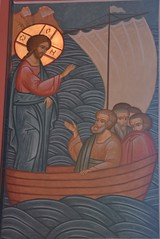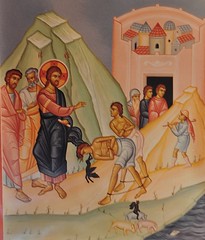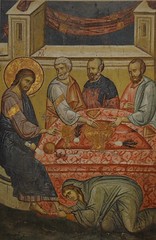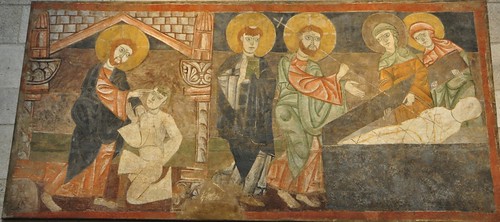And getting into a boat he crossed over and came to his own city. And behold, they brought to him a paralytic, lying on his bed; and when Jesus saw their faith he said to the paralytic, “Take heart, my son; your sins are forgiven.” And behold, some of the scribes said to themselves, “This man is blaspheming.”
But Jesus, knowing their thoughts, said, “Why do you think evil in your hearts? For which is easier, to say, ‘Your sins are forgiven,’ or to say, ‘Rise and walk’? But that you may know that the Son of man has authority on earth to forgive sins” — he then said to the Paralytic — “rise, take up your bed and go home.” And he rose and went home. When the crowds saw it, they were afraid, and they glorified God, who had given such authority to men. (Matthew 9:1-8)
A most interesting Gospel lesson. This is another miracle in which Jesus is able to see the faith of the people who bring a paralyzed man to Him. He is not just looking at their behavior, but really into their hearts. Faith is something that is visible to those who have the eyes to see. Our behavior should allow people to see our faith, to reveal what is in our hearts and souls. The opposite of this is Judas who greets Jesus with the kiss of peace in order to conceal the treachery in his heart.
Note also, it is not the paralyzed man’s faith that Jesus notices, but the faith of those who brought the paralyzed man to Christ. Here we see the nature of intercessory prayer – when we ask God for help for others, our faith becomes visible through our love. God takes notice.
And yet in the Gospel text, this crowds asks nothing from Christ they are completely silent. They lay the paralytic before Christ hoping that He sees the need and knows what to do. They are not asking for a particular outcome but trusting that Christ will give love to the paralytic. Their motivation is not mentioned, no details are given about whether the man is worthy of Christ’s attention.
One can imagine that these people with faith are bringing their friend to Christ in love hoping Christ can help. A good story of faith and love. But the Gospel doesn’t tell us this, so one can also easily imagine these people are bringing someone to Christ who neglected Torah, destroyed his life through sin, ended up paralyzed because of his own bad behavior and then complained bitterly about his fate. They are bringing the paralyzed man to Jesus the Prophet for Jesus to pronounce judgment on the man to get him to shut about his bitterness and to force him to face his predicament is the result of his own sinfulness. The faith Jesus sees in them is their belief in their own righteousness as keepers of Torah. Jesus astounds them by forgiving the man and then healing him. That would better explain the reaction of the scribes in thinking Jesus blasphemes and the reaction of the crowd – fear. Why were they suddenly terrified at the healing when they are the very ones who brought the man to Jesus? Possibly because they suddenly saw themselves – not the paralytic – as condemned for their behavior. But then marveling at the amazing love of God as they begin to hear the Gospel instead of Torah.
This interpretation sees this lesson as being like John 8:1-11, the woman caught in adultery who the crowd wants to stone but they bring to Christ for Him to pronounce judgment on her, but instead He says, “Let anyone among you who is without sin be the first to throw a stone at her.” One by one the shamed people drop their stones and walk away until Christ is left alone with the adulteress. The woman sees their is no one left to judge her, and Christ says to her: “Neither do I condemn you. Go your way, and from now on do not sin again.”
Christ forgives the sin of the paralytic and tells him to take heart. The paralytic has not asked for forgiveness nor has he offered repentance. Jesus, however, offers comfort, encouragement and hope to the man. Christ offers what He knows the man needs. As one of the prayers in our tradition says:
I know not what to ask of You: I ask for neither a cross nor consolation for You alone know what my true needs are.
This crowd brings the paralyzed man to Jesus to see what Jesus will do, not to ask for what they want or hope. Their prayer is complete trust in God’s will. Lord do you see what we see in this suffering man? What is Your will Lord?
It is a holy way to pray for God. We intercede for others by offering up their names and needs in our daily prayer but then trusting God to respond as God wills even if God’s response astounds us, terrifies us or disappoints us.
Your will be done.
Many people wonder how to pray and for what they should pray. This Gospel lesson teaches us one aspect of prayer – just present the names of those you care about to God. Let God decide what they need. You don’t have to ask for anything, just care about others and offer them up to God in prayer. Prayer isn’t necessarily about you knowing everything you need to say and knowing how to say it perfectly. It is you placing before God those you care about, asking God to consider them. In as much as God is love, let God decide what to do with those for whom we pray. Don’t tell God what to do, ask God to note those you are concerned about. In this way we can pray for everyone whether we think they deserve mercy or judgment – place them all in God’s hands and then let God do God’s own will!
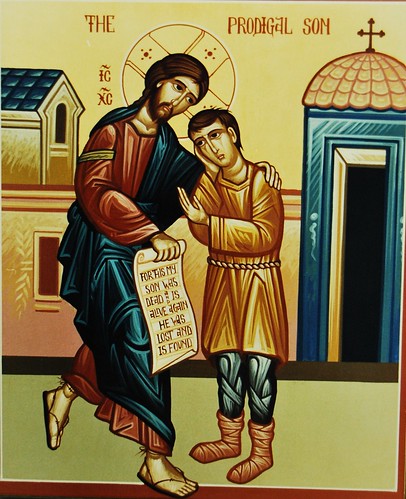 In the Gospel lesson, Jesus does not ask the man to repent, He does not expose the man’s sins or denounce his misdeeds. Instead, Christ simply forgives the man without asking anything in return. No moral injunction is given to the man and no moral change is demanded from the man. Jesus does not call the healed man to become a disciple. Rather Jesus sends him home. The man obeys and goes home, he doesn’t even thank Jesus or ask to become his follower. Christ gives expecting nothing in return.
In the Gospel lesson, Jesus does not ask the man to repent, He does not expose the man’s sins or denounce his misdeeds. Instead, Christ simply forgives the man without asking anything in return. No moral injunction is given to the man and no moral change is demanded from the man. Jesus does not call the healed man to become a disciple. Rather Jesus sends him home. The man obeys and goes home, he doesn’t even thank Jesus or ask to become his follower. Christ gives expecting nothing in return.
Give to every one who begs from you; and of him who takes away your goods do not ask them again. And as you wish that men would do to you, do so to them. “If you love those who love you, what credit is that to you? For even sinners love those who love them. And if you do good to those who do good to you, what credit is that to you? For even sinners do the same. And if you lend to those from whom you hope to receive, what credit is that to you? Even sinners lend to sinners, to receive as much again. But love your enemies, and do good, and lend, expecting nothing in return; and your reward will be great, and you will be sons of the Most High; for he is kind to the ungrateful and the selfish. Be merciful, even as your Father is merciful. (Luke 6:30-36)
Christ’s miracles in the NT are often done for the poor, for sinners, for outcasts – we should look for such opportunities among all types of people to minister to them – freely give to them, expecting nothing in return.
Who can we bring to Christ – either to the Church or in our prayers? Those in need of spiritual, physical, moral or emotional healing.
The crowds will not be praising God because we get a new convert, a new member for the parish. They will praise God when they see lives which are changed or different, when they see something different in us.
The entire Gospel lesson calls to mind the Psalm we regularly sing as an antiphon at most Liturgies:
Bless the LORD, O my soul; and all that is within me, bless his holy name! Bless the LORD, O my soul, and forget not all his benefits, who forgives all your iniquity, who heals all your diseases, who redeems your life from the Pit, who crowns you with steadfast love and mercy, who satisfies you with good as long as you live so that your youth is renewed like the eagle’s.
The LORD works vindication and justice for all who are oppressed. … The LORD is merciful and gracious, slow to anger and abounding in steadfast love. He will not always chide, nor will he keep his anger for ever. He does not deal with us according to our sins, nor requite us according to our iniquities. For as the heavens are high above the earth, so great is his steadfast love toward those who fear him; as far as the east is from the west, so far does he remove our transgressions from us. As a father pities his children, so the LORD pities those who fear him. For he knows our frame; he remembers that we are dust. (Psalm 103:1-14)







